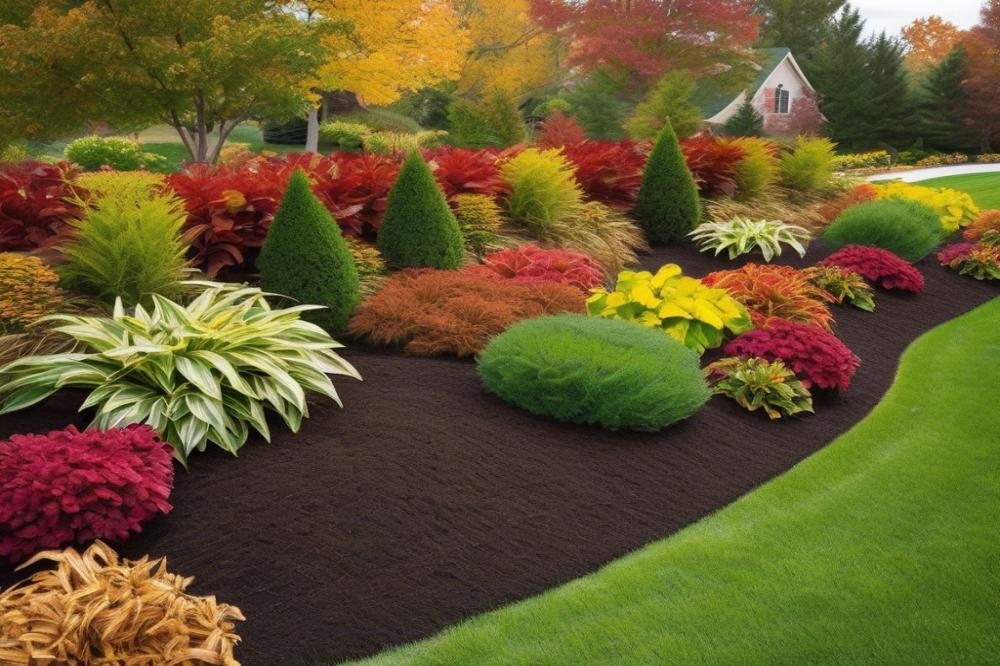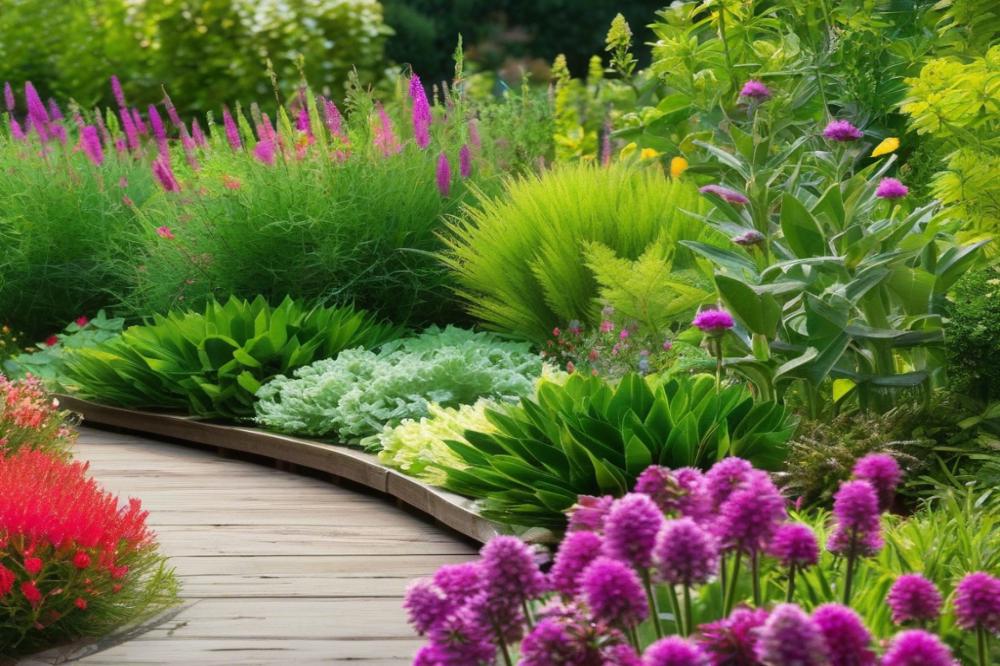The Importance of Mulching in Preventing Garden Pests
Gardening can be a rewarding hobby, but it comes with its share of challenges. Gardeners often face problems like harsh weather, stubborn weeds, and, perhaps most frustratingly, various pests that threaten the health of their plants. Dealing with these nuisances requires knowledge and effective strategies.
One method gaining attention is Mulching. This practice involves covering the soil around plants with organic materials such as wood chips, straw, or composted materials. It serves as an effective pest control measure by creating a barrier that hinders pests from reaching plants. Furthermore, it provides multiple benefits that contribute to overall garden health.
Using organic mulch goes beyond just pest prevention. It enhances soil moisture retention, which lessens the need for frequent watering. By suppressing weeds, organic materials also minimize competition for nutrients and light. A healthy garden can attract beneficial insects, which play a vital role in controlling pest populations naturally. Adoption of various mulch types can amplify these advantages, creating a thriving ecosystem.
Practicing organic gardening carries its own unique environmental benefits. Fewer chemicals are utilized, reducing pollution and fostering healthier soil. By creating a harmonious balance in the garden, gardeners can focus on landscape maintenance that truly supports their plants. Overall, embracing techniques like mulching allows for sustainable gardening practices while effectively battling Garden Pests.
The Role of Mulching in pest control
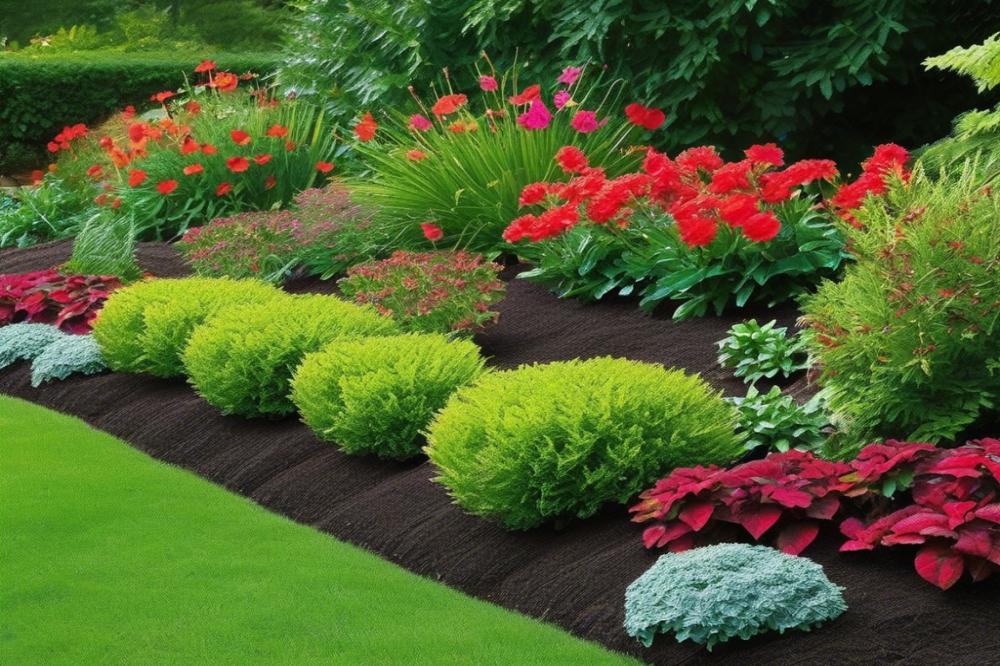

Creating a barrier against pests is one of the main functions of a layer of organic material on garden beds. This protective cover makes it harder for unwanted insects to access plants. A thick layer can deter pests by making it physically difficult for them to reach the leaves and stems. Good landscape maintenance often involves integrating these methods for best results.
When an environment is modified through mulching, the microclimate around plants can change significantly. It helps to maintain soil moisture, which is crucial for healthy plants. A consistent moisture level not only promotes growth but also reduces stress on the plants, making them less vulnerable to pest invasions. Furthermore, by suppressing weeds, mulch eliminates frequent hiding spots for harmful insects, creating a less inviting area for them.
Different mulch types yield various impacts on garden health. Some materials, like composted materials, can attract beneficial insects. These insects can help control populations of harmful ones, naturally balancing the ecosystem. This approach minimizes the need for harmful pesticides while enhancing the garden’s vitality.
The prevalence of damaging insects may also decline with proper mulching. Many pests thrive in bare soil. However, when you cover it, you decrease their ideal habitats. A carefully mulched garden discourages pest establishment, leading to a healthier overall environment.
By focusing on organic mulch, gardeners can enjoy multiple environmental benefits. It supports a thriving ecosystem, benefiting both plants and insects. This technique not only enhances aesthetics but also aligns with sustainable gardening practices. Optimizing pest control through the use of mulch ultimately fosters a more balanced and resilient garden.
Types of Organic Mulch and Their Benefits


Understanding the various mulch types can help gardeners make informed decisions for their landscape maintenance. Wood chips are a popular choice. They break down slowly and provide long-lasting benefits. Straw is another option. It’s lightweight and helps with weed suppression while also adding organic matter as it deteriorates.
Leaves can be collected in the fall and used as mulch, too. Shredded leaves are excellent at holding moisture and enriching the soil. Grass clippings are often regarded as a convenient choice. They decompose quickly, releasing nutrients back into the ground. This makes them beneficial for young plants, especially in spring.
Specific Benefits of Composted Materials
Composted materials stand out because they provide rich nutrients. When combined with other organic mulch, compost can enhance soil structure. This improves drainage and promotes healthy root growth. Beneficial insects also thrive in composted environments, adding another layer of pest control. These insects often help maintain a natural balance in the garden. They can keep harmful pest populations in check without the need for chemical interventions.
How Different Mulches Impact Soil Moisture and Garden Health
Different mulch types impact soil moisture levels significantly. A thick layer of wood chips, for example, can retain moisture very well. Conversely, straw allows water to penetrate while still blocking out sunlight, which helps suppress weeds. Grass clippings can create a dense mat that is effective in keeping the ground moist. Organic mulch, in general, contributes to healthier garden ecosystems.
The right choice can affect not only moisture retention but also soil temperature. Insulating materials, like leaves or straw, can keep roots cooler in the heat. Understanding these benefits leads to better decisions for sustainable gardening practices. Environmental benefits also arise when using organic options. They reduce landfill waste and improve carbon retention in the soil.
Encouraging Beneficial Insects with Mulching
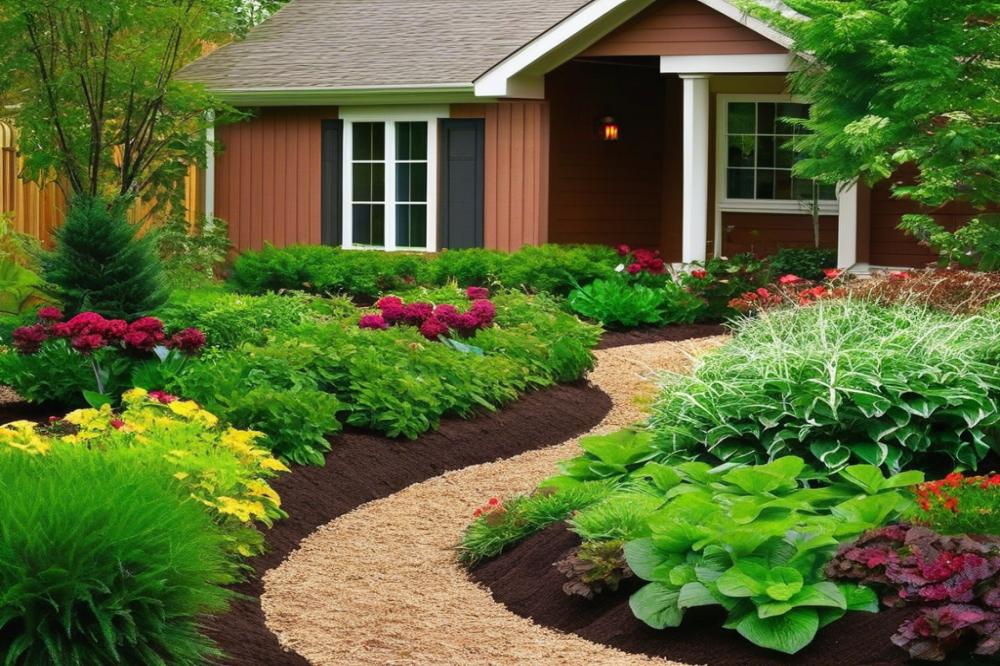

Beneficial insects play a crucial role in natural pest control. These tiny allies help keep harmful species in check. They can also improve overall garden health by pollinating plants and breaking down organic matter.
Creating habitats for these insects is essential. Organic mulch offers many advantages. It provides shelter and nesting sites, making gardens more inviting to beneficial species. Additionally, it enhances soil moisture, which is vital for both plants and insects. The right mulch types can attract a variety of these helpful insects.
Attracting beneficial insects can be simple. Start by using composted materials in your garden. This adds nutrients to the soil and encourages a rich ecosystem. Consider planting a diverse mix of flowers. Sunflowers, marigolds, and dill are all excellent choices. They can provide both food and shelter.
Landscape maintenance practices yield better results with an integrated approach. Avoid using pesticides that can harm beneficial insects. Selecting alternatives to keep pests in check will benefit the overall environment. Remember to keep some areas slightly untidy. Leaving patches of bare ground can encourage ground-nesting insects.
Incorporating these strategies helps keep your garden thriving. This not only allows beneficial insects to flourish but also contributes to effective weed suppression. Fostering these insect populations leads to a healthier and more resilient garden.
Weed Suppression and Improved Soil Health
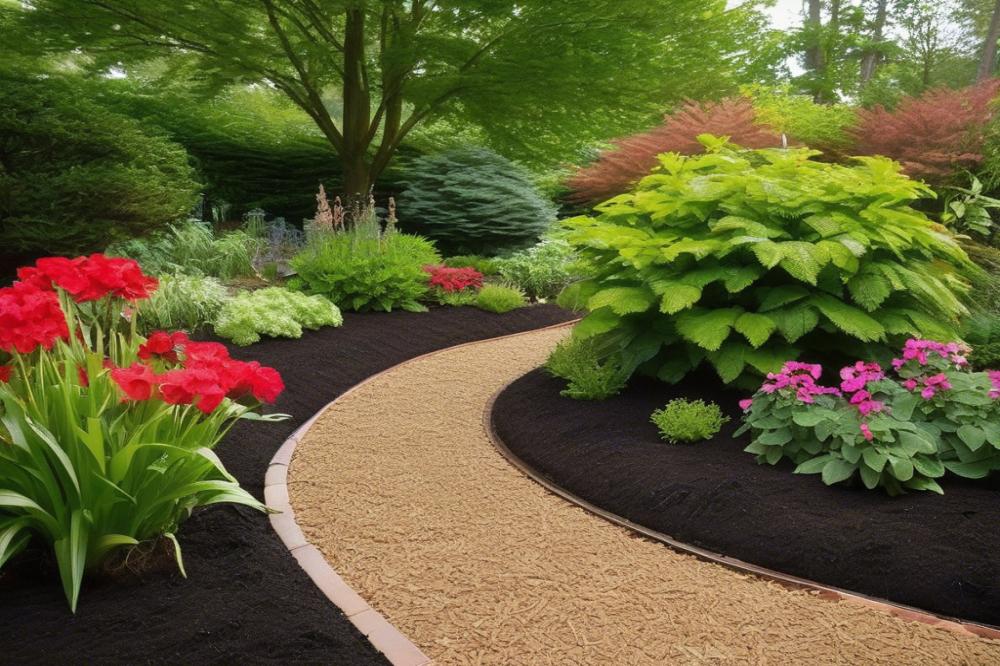

Mulch plays a pivotal role in weed control. By covering the soil, it prevents sunlight from reaching weed seeds. This barrier reduces competition for nutrients and water. As a result, plants have more resources to thrive. When weeds are fewer, they do not attract as many pests. Fewer weeds mean a decrease in pest populations.
Weed suppression directly impacts garden health. Less competition allows for healthier plants. Those robust plants can better fight off pest issues. Many common pests prefer to hide in the dense foliage of weeds. By keeping these unwanted plants at bay, you also help prevent infestations. This creates a balanced ecosystem that fosters beneficial insects.
Using organic mulch provides additional benefits for soil health. Composted materials break down over time, enriching the ground. Essential nutrients are released back into the soil, benefiting plants. Healthy soil retains moisture, reducing the need for frequent watering. This water retention is especially crucial during dry spells. Moreover, the addition of organic matter supports a diverse microbial community.
Diverse mulch types contribute to different aspects of landscape maintenance. Bark, straw, and wood chips each have unique properties. Selecting the right type can improve soil structure and enhance aesthetic appeal. This practice fosters a healthier garden overall. Additionally, organic mulch can help retain soil moisture for longer periods, giving plants a steady supply of water.
There are significant environmental benefits associated with mulching. Reducing the need for chemical herbicides and pesticides leads to safer gardening. Using natural approaches promotes sustainability in your landscape. By improving weed control and soil health, gardeners can help maintain a thriving ecosystem.
Environmental Benefits of Mulching
Using organic mulch delivers numerous advantages for garden maintenance. It promotes healthy landscapes by enriching the soil. Composted materials, such as leaves and grass clippings, break down over time. This process adds essential nutrients back to the earth, strengthening overall garden health.
Water conservation is another key benefit. A good layer of mulch helps retain soil moisture. This means less frequent watering is needed, which can save both time and resources. Gardeners can enjoy their plants while minimizing environmental impact. Improved soil moisture levels also facilitate strong root growth and healthier plants.
Weed suppression enhances the garden’s resilience. By blocking sunlight, mulch keeps pesky plants from sprouting. Fewer weeds mean less competition for nutrients and water. It ultimately leads to stronger, healthier crops. Beneficial insects also thrive in mulched areas, fostering natural pest control. Encouraging these allies makes a garden more robust in fighting off unwanted pests.
Practicing landscape maintenance in this way is sustainable and practical. Various mulch types serve different purposes. For instance, wood chips, straw, or grass clippings can all fulfill similar roles with unique properties. Each type adds its own flavor to the garden’s ecosystem while supporting environmental benefits.
In summary, using mulch improves not just the aesthetics of the garden but its overall ecology. With proper application, gardeners foster a healthier environment, which ultimately leads to sustainable practices and long-term success. Maintaining this balance is achievable for anyone with a passion for gardening.
Practical Tips for Effective Mulching
Best Practices for Applying Mulch
Applying the right type of organic mulch can greatly enhance garden health. Begin by selecting materials like wood chips, straw, or shredded leaves. These composted materials not only add nutrients but also improve soil texture as they decompose. Spread the mulch evenly around your plants, but avoid piling it against plant stems. This can cause rot and attract unwanted pests. A layer of organic mulch can also attract beneficial insects, which naturally aid in pest control.
Recommended Depth and Timing for Mulching
Timing plays a vital role in how effective mulch can be. It’s best to apply it in early spring, just as the soil begins to warm up. Applying mulch at this time helps lock in soil moisture during dry months. Aim for a depth of about two to four inches. This amount provides adequate weed suppression without smothering plant roots. Once applied, monitor the mulch throughout the growing season. You may need to replenish it as it breaks down.
Integrating Mulching with Other Organic Pest Control Methods
Mulching works well when combined with other organic pest control strategies. Consider companion planting, which involves planting different species close together. This can confuse pests while attracting more beneficial bugs. In addition, using trap crops helps lure harmful insects away from your main plants. By creating a diverse garden, you strengthen your defenses against pests. Layering these techniques amplifies the environmental benefits, ensuring a healthier ecosystem in your landscape maintenance efforts.
Wrapping Up the Benefits of Mulching for Pest Defense
In summary, using mulch in the garden serves as more than just a decorative layer. It plays a vital role in pest control by creating a barrier that deters unwanted insects and diseases. Proper coverage helps regulate soil temperature and moisture, contributing to plant health. Healthier plants are often more resistant to pests and diseases, making a win-win situation for gardeners.
When it comes to nurturing your garden, healthy practices are essential. Simple habits, like maintaining a clean garden and incorporating organic mulch, can produce remarkable outcomes. These steps not only protect plants but also enrich the soil, leading to thriving growth. Understanding these techniques fosters a deeper connection to nature.
Consider making mulching a staple in your organic gardening strategy. Such practices lead to a balanced ecosystem and can significantly reduce the need for chemical interventions. Embracing these methods can nurture your garden while protecting the environment. Take the initiative today, and see how your dedication to these practices can benefit both your plants and the planet.

